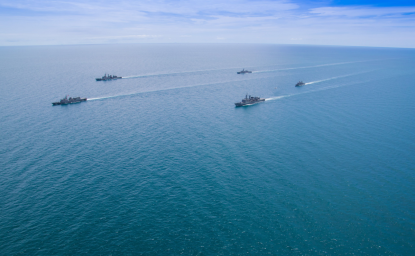
The Pakistan military on June 15 launched a long anticipated and much delayed military operation in North Waziristan, the tribal agency along the Pakistan-Afghanistan border that has been the center of operations for many militant groups, including the Tehrik-e-Taliban Pakistan (TTP) and the Haqqani Network. After two weeks of aerial bombardment, ground troops moved into North Waziristan, only to find it deserted of most high- and mid-ranking militant commanders.
The military spent much of July destroying militants’ tunnel hideouts and weapons caches, carrying out search operations, and killing low-level fighters -- according to the military’s public relations wing, more than 450 were killed a month into the operation. But high-level targets have been scarce (even news of the arrest on July 15 of TTP commander Adnan Rashid, who was convicted of attempting to assassinate former president and army chief Pervez Musharraf, turned out to be incorrect). In a rare candid moment, a military commander in North Waziristan in early July conceded that most senior Taliban militants had fled the tribal belt before the operation began.
The militant exodus has led Pakistan to request Afghanistan’s support for its ongoing military operation, including the eradication of militant sanctuaries in Afghan provinces from where militants carry out attacks against targets in Pakistan. Days after the operation began, Pakistan asked Afghanistan to extradite Maulana Fazlullah, the current chief of the TTP who has maintained sanctuaries in the Afghan provinces of Kunar and Nuristan since 2009, when he fled a military operation in Pakistan’s Swat Valley. The Haqqani Network too has traditionally had sanctuaries in Khost.
Pakistan’s calls for Afghanistan to stamp out militant sanctuaries across the border stem from increasing concerns about what has been termed ‘reverse blowback’ -- Afghanistan-based militants launching cross-border attacks against targets in Pakistan. Up to 80 militants on July 29 crossed the Durand Line to attack a Pakistan military checkpost in Dir, leading Pakistan to summon an Afghan diplomat to register a protest over the cross-border militant attack. Such ambushes are increasing in frequency--Pakistani soldiers on May 30 engaged in gun battles and launched airstrikes against Afghanistan-based militants who attacked military checkposts in Bajaur Agency. The cross-border attacks were likely carried out by TTP fighters originally from Bajaur and Swat, now based in hideouts in the village of Ghund in Afghanistan’s Kunar province. The dispersal of militants following the North Waziristan operation will only escalate such attacks.
Unsurprisingly, Afghanistan is displeased with Pakistan’s request for improved counter-terrorism coordination and Kabul’s support to stamp out sanctuaries of anti-Pakistan militants in Afghanistan. The issue of cross-border militant attacks has, after all, been Afghanistan’s main gripe with Pakistan for more than a decade. Kabul has repeatedly called on Islamabad to eradicate militant sanctuaries in the Federally Administered Tribal Areas (FATA) from where the Afghan Taliban and Haqqani Network have planned and launched attacks against international coalition troops and the Afghan security forces.
Rather than respond favorably to Pakistan’s calls for cooperation, Afghanistan has reiterated its complaints against Pakistan, claiming that Pakistan-backed militants are responsible for the uptick in militant attacks in Afghanistan this summer, including the suicide attack in a busy market place in the Paktika province on 15 July, in which 89 people were killed, one of the highest civilian tolls in recent years. Afghan officials have also rejected Pakistani claims that the military is pursuing Haqqani Network militants as part of its North Waziristan operation. Afghan Interior Ministry spokespeople have stated that Pakistan allowed members of the Haqqani Network to escape FATA before launching the operation, and say the operation is unlikely to impact the group’s operations. In a strong indication of deteriorating bilateral relations, Afghan President Hamid Karzai on 24 July said that “Afghanistan is actually holding peace talks with Pakistan and not with the Afghan Taliban”, implying that Pakistan-backed militants remained Afghanistan’s greatest security challenge.
The blame game is politically convenient for both sides. Pakistan’s government and military can point to the relocation of militant groups to Afghanistan as the reason why the security situation continues to deteriorate despite the military operation in North Waziristan and other counter-terrorism initiatives such as the security crackdown against militant and criminal groups in the port city of Karachi, which has been underway since September 2013. Afghanistan too can point to Pakistan as the source of its security problems, particularly the resurgence of the Taliban ahead of the international troop withdrawal deadline of December 2014. By placing blame across the border, the governments in both Pakistan and Afghanistan can dodge accountability and continue to attribute mounting security challenges to external factors.
But in this blame game, there are only losers. The threat from militancy is increasing in both Pakistan and Afghanistan. Pakistan saw a 9 percent increase in the number of terrorist attacks between 2012 and 2013, and the North Waziristan military operation has driven TTP fighters into major Pakistani cities, including the capital Islamabad, where the public is bracing for reprisal attacks against soft targets. Though there have been few such attacks thus far, militant groups in urban areas have escalated networking and fundraising through kidnapping, armed robberies, and extortion. Attacks are likely to increase once groups have gathered resources and consolidated urban operations. Meanwhile, the Afghan Taliban has taken advantage of the international troop withdrawal to launch coordinated attacks to regain control of districts in Helmand, Kandahar and Ghor provinces. Militant groups active in both countries continue to take advantage of the porous Durand Line and increasingly draw strength from each other.
The idea that Pakistan and Afghanistan are fighting separate enemies is also increasingly redundant. A TTP spokesman in October 2013 stated that the Afghan Taliban was providing financial support and safe havens in Afghanistan for the Pakistan Taliban. Increasing cooperation between the Afghan Taliban and TTP also reportedly led Pakistan’s security establishment in April to issue a warning to the former, saying that they could not rely on tacit support from Pakistan if they continued to facilitate the TTP. A coordinated counter-terrorism strategy is increasingly the best way forward for Pakistan and Afghanistan in terms of stemming the threat from militancy on both sides of the Durand Line.
Unfortunately, by placing blame across the border, Pakistan and Afghanistan are not only ignoring ground realities, but also distracting from governance failures that are stalling domestic counterterrorism initiatives. For example, the Pakistan government launched the first-ever National Internal Security Policy in March 2014 but has since done little to implement its clauses. The cornerstone of the policy -- operationalizing a National Counter-Terrorism Authority (NACTA) tasked with coordinating counter-terrorism strategies and intelligence gathering efforts at the federal and provincial levels -- has been repeatedly delayed owing to administrative bungling: a parliamentary act passed in 2013 placed the authority directly under the prime minister’s control; however, a subsequent federal government notification split control of NACTA, placing the authority under the prime minister for administrative purposes and under the Interior Ministry for operational matters. An Islamabad High Court ruling in July returned the control of NACTA to the prime minister’s office, but the authority remains non-functional.
In Afghanistan, meanwhile, a concerted effort to address the continuing Taliban threat -- including building the capacity of the Afghan National Security Forces, finalizing the Bilateral Security Agreement with the United States, and initiating negotiations with the Taliban -- will be delayed as a result of political uncertainty resulting from the 2014 presidential elections. The outcome will lack credibility, even after the completion of the audit of the votes cast during the second round of voting in June. Moreover, the proposed national unity government, which will include both leading candidates Abdullah Abdullah and Ashraf Ghani, is likely to wrestle with infighting and internal power tussles as the leaders define their roles and accommodate their supporters in official positions. Counter-terrorism initiatives are likely to be deprioritized as the government establishes itself, despite an increase in Taliban activity.
Despite historic tensions, there is an opportunity for Pakistan and Afghanistan to develop a bilateral counter-terrorism strategy. The director generals of military operations on both sides met on July 3 to discuss cross-border operations and militant sanctuaries on both sides of the border. If Islamabad and Kabul stop playing the blame game, such engagements could be built upon to develop a coordinated and comprehensive strategy, including improved border control.
In addition to ceding space to militant groups, the practice of pointing fingers across the border is also limiting the scope of the bilateral relationship. As long as Pakistan and Afghanistan blame each other for the continuation of militant attacks on their territory, the relationship will be dominated by security issues, and led on the Pakistan side by the security establishment. This dynamic leaves little space for the two countries to engage on other, equally vital issues, including bilateral trade, shared energy infrastructure, the distribution of increasingly scarce water resources and the formalization of the Durand Line as a border.
There has been a significant shift in both Pakistan and Afghanistan vis-a-vis the militant threat in recent months. The public on both sides of the Durand Line has rejected militancy as evidenced by the historic turnout of voters despite threats from the Taliban in Pakistan’s general election in 2013 and Afghanistan’s 2014 presidential election. It would be tragic if the opportunity to act on the public and political consensus against militancy is squandered because of bilateral tensions and a desire among the administrations in both Pakistan and Afghanistan to remain unaccountable for domestic security provision.
Huma Yusuf is a Wilson Center Global Fellow and the senior Pakistan and Afghanistan analyst at Control Risks.





